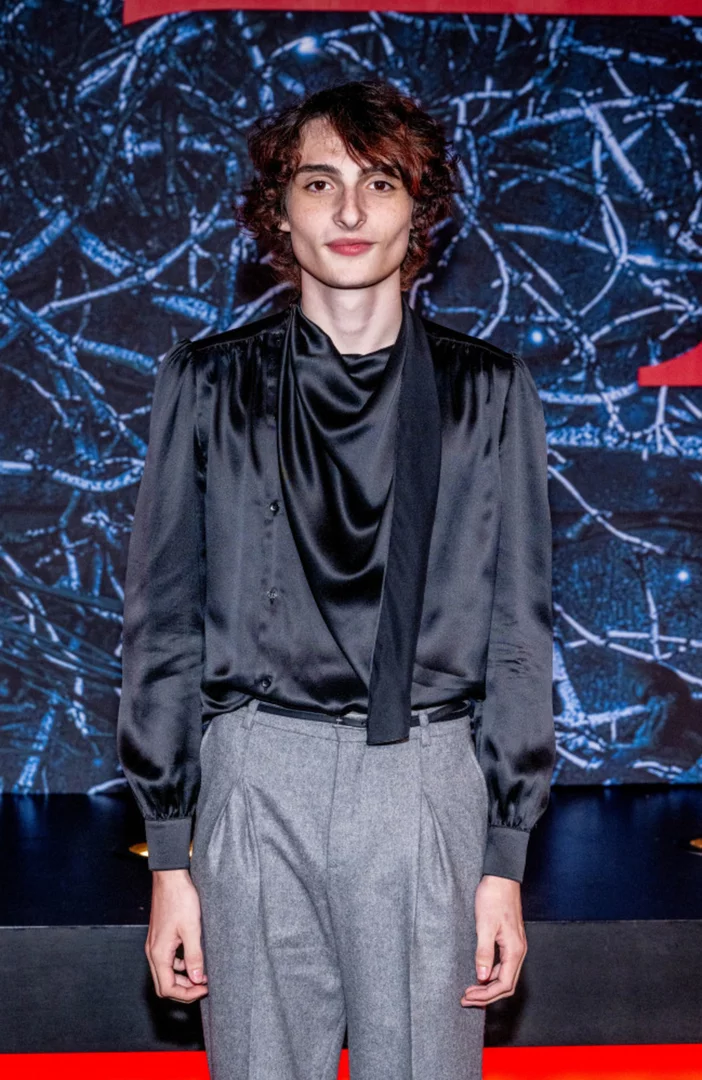
Pamela Anderson reveals powerful inspiration behind makeup free style
Pamela Anderson has revealed how her makeup free style is "all about self-acceptance".
2023-10-04 17:22

Stranger Things star Finn Wolfhard credits Saint Laurent with evolving his style choices
'Stranger Things' star Finn Wolfhard has credited his Saint Laurent campaign with developing his own sense of style.
2023-10-04 17:21

September Broke the Global Heat Record by a ‘Gobsmackingly Bananas’ Margin
The global average temperature for September broke records by such an absurd margin that climate experts are struggling
2023-10-04 17:21

Demi Lovato announces her own holiday special
Demi Lovato has vowed to put her own "special twist" on the holidays.
2023-10-04 17:18

Paloma Faith announces comeback single, How To Leave A Man
Paloma Faith has announced her first new music since 2020.
2023-10-04 17:17

'Our call time was 1 in the morning': Bradley Cooper spent five hours in makeup for Maestro
Bradley Cooper sat for five hours in the makeup chair so he could transform into Leonard Bernstein for his biopic 'Maestro'.
2023-10-04 17:15

More than a quarter of middle-aged women living with ‘metabolically healthy obesity’ – study
Almost one in 10 middle-aged men and more than a quarter of middle-aged women in the UK are “fit but fat”, researchers have said, as they called for more to be done to help people reduce their weight. Academics said that there are large regional differences over levels of “metabolically healthy obesity”, which could be down to different diets or other lifestyle factors as well as ethnic and genetic differences. People who are “fit but fat” are considered to be obese by their body mass index (BMI) score but have none of the complications associated with obesity including abnormal blood sugar levels; high cholesterol; high blood pressures; type 2 diabetes or other signs of heart disease. The UK has similar levels seen in Sweden, Norway and Germany, experts said. The highest proportion of metabolically healthy obesity is observed in France and other Mediterranean countries such as Italy and Israel, experts told the the Annual Meeting of the European Association for the Study of Diabetes. There will always be people living with obesity who seem to be protected against obesity-related cardiometabolic diseases Prof Mattias Bluher One study shows that 8% of men and 27% of women in the UK aged between 40 and 50 are living with “metabolically healthy obesity”. Asked how many people in the UK are affected, Professor Matthias Bluher, of the University of Leipzig and Helmholtz Centre Munich in Germany, said: “The (UK) is very similar to situation Sweden, Norway and Germany. “There are populations in Micronesia or Asian populations where it is down to 2-5% only. “Some populations may be, despite large amounts of adipose tissue, better protected against comorbidities and Caucasian populations belong to those.” Prof Bluher said that healthy obesity is seen in a number of premenopausal women. It comes as Prof Bluher called for better weight management programmes for people who fit the profile. He pointed to previous work which suggests people who are “healthy obese” have a higher risk of coronary heart disease, cerebrovascular disease and heart failure compared to their in a normal weight range. “There will always be people living with obesity who seem to be protected against obesity-related cardiometabolic diseases,” he told the conference. “The concept that metabolically healthy obesity affected people may not benefit from weight loss strategies has been challenged by recent data. “A timely and personalised treatment of obesity should also be recommended to people living with healthier obesity.” Read More Charity boss speaks out over ‘traumatic’ encounter with royal aide Ukraine war’s heaviest fight rages in east - follow live Jonnie Peacock on Strictly Come Dancing representation: ‘It’s important to break people’s perceptions’ What you need to know about depression during menopause – as Carol Vorderman opens up Autumn pests to look out for and how to get rid of them in your home and garden
2023-10-04 16:56

Stevie Nicks hails Daisy Jones and the Six
Stevie Nicks has admitted to being a huge fan of 'Daisy Jones and the Six', the hit TV mini-series.
2023-10-04 15:20

Nicol Paone 'floored' by Uma Thurman casting in The Kill Room
Nicol Paone has revealed that she's thrilled to have worked with Uma Thurman on 'The Kill Room'.
2023-10-04 15:19

Scott Derrickson reveals The Black Phone 'prequel' reference in new horror film
Scott Derrickson has referenced 'The Black Phone' in new horror 'V/H/S/85' and confirmed a shared universe.
2023-10-04 15:17

Jonnie Peacock on Strictly Come Dancing representation: ‘It’s important to break people’s perceptions’
BBC One’s Strictly Come Dancing has been “fantastic” for disability representation, says Jonnie Peacock MBE – the show’s first amputee contestant. The sprinter and paralympian, who was partnered with professional dancer Oti Mabuse in 2017, helped pave the way for celebrities with disabilities, including presenters Rose Ayling-Ellis and JJ Chalmers. The new 2023 series sees cyclist and swimmer Jody Cundy – who, like Peacock, had his right leg amputated just below the knee – compete with Jowita PrzystaÅ‚, who lifted the glitterball trophy last year with Hamza Yassin. “For me, going on Strictly was important to attempt to break people’s perceptions and make them realise the reason that I would be a bad dancer would absolutely not be my leg,” says the 30-year-old. “My leg is actually one of my strong suits! “Rhythm,” he laughs, “That was more the problem.” Peacock – who became a household name after smashing the world record and claiming gold in the 100m T44 final at London 2012 Paralympic Games – said by appearing on the popular dancing show, he was “trying to get people to understand that we look at someone and we instantly judge what they’re able to do, and put them in a box”. The World Health Organisation estimates that 16% of the world’s population is disabled. “But when you look at your TV – especially 20 years ago – it [looked like] 0.1%, and the same with race and gender,” notes Peacock. “Now people are starting to realise that we want our world to be reality, and we want our [TV] world to encompass what it actually looks like. “It’s not just Strictly, pretty much all of the reality TV shows have disabled contestants in [now]. It’s so important. It’s a way to show that we are an individual, and that we have something to give.” Peacock was recently made an ASICS ambassador (“It’s really cool to be working with a brand who actually care about a lot of the things I care about – that it’s so much more than sport,” he says). And after a difficult summer on the track, he’s looking ahead to the indoor winter para season and the Paris Paralympics next summer. “I felt the worst I’ve felt in years, as soon as I got past 50 or 60 metres [during Paris Para Athletics World Championships in July],” says the sprinter, who later discovered he had hamstring tendinopathy. “I’d kind of lost the love of the event. Even though I love training, I didn’t enjoy competing too much. Even though I love doing it, it was bringing me a lot of misery.” As well as injury niggles, he’s been having issues with the alignment of his prosthetic blade. For para athletes, this technical side of the sport adds additional complication. “I used to love that, but there was a couple of years where I just felt off balance and didn’t realise why,” he says. “We had to play with so many different settings… that was the moment where I was constantly [thinking], ‘I wish I had a foot there where it should be, I wish I didn’t have to worry about setting this up and could just go for it’.” Peacock was five when he almost died from meningitis and his right leg had to be amputated – a time he has few memories of (“I have one flashback in the back of the car being rushed to hospital, with my Power Rangers duvet wrapped around me”). Growing up, he had several bone revision surgeries – “because once you’ve had an amputation, the bone will carry on growing,” explains Peacock. Now though, he’s showing no signs of slowing down, even though sprinter careers are notoriously short. For the next Paralympics, “It’s gold or nothing – Felix [Streng of Germany] has got it now [after Tokyo 2020], but my plan is to hopefully make him the shortest Paraylmpian champion ever.” After being so dominant in the 100m for so long (he’s a two-time Paralympic gold medalist, two-time world champion, and two-time European Championship gold medalist), what keeps him motivated to win? “It’s probably greed,” he laughs, “It’s just never enough, you just want more, it’s an addictive feeling. It’s like you’re just constantly chasing to try be a better athlete – a better version of you.” And with age has come a better understanding of how his own happiness and mental health is tied to his physical health. “I don’t exercise for a period of time, I can get a little bit almost, not depressed, but edging on that, just not happy, very lethargic,” he reveals. Youth comes with a blissful naivety about health, he says. Before, “I never really realised that every time I exercised, I felt better afterwards. Now [my body] is more sensitive. I don’t feel fantastic 24/7, creaks and aches start to appear, grogginess, fatigue…” These days, when he’s not feeling his best, he’ll start a day with a 15-minute indoor bike session at home, where he lives with para athlete girlfriend Sally Brown. “I hate it, I literally hate it!” he laughs. “I want to sit on the sofa and watch TV [instead]. I feel atrocious for 10 minutes afterwards, but then I bounce up so high for the rest of the day, I’m so happy. “The closest thing that affects my mental health is my [physical] health. If I eat like crap, if I sleep like crap, if I don’t exercise, I will be in a bad mental health space. If I exercise, even just a little bit, if I eat well, if I sleep well, I don’t feel like that. It’s understanding there’s a cause and effect relationship to a lot of things.” He swears by the feel-good endorphins of a freezing cold shower everyday. “My friend told me about Wim Hof [the Dutch endurance athlete known as The Iceman] six or seven years ago. I hate hot showers now, to the point where I was in a hotel once and had to get the engineer to come up because the shower didn’t go cold [enough].” Peacock says he tries to remember that “life is a game” and “a gift”. He continues: “We waste it because we take it too seriously. And we’ve been forced to take it too seriously by the outside world – we’ve been given pressures, we’ve been given expectation, and you end up allowing the stress to enclose you and take you away from that childhood mentality of just going out and having fun. “When you’re dead, you’re not going to be sitting there going, ‘Oh, I wish I’d kept my boss a bit happier’.” Jonnie Peacock is sponsored by ASICS. To find out more visit asics.com. Read More Charity boss speaks out over ‘traumatic’ encounter with royal aide Ukraine war’s heaviest fight rages in east - follow live What you need to know about depression during menopause – as Carol Vorderman opens up Autumn pests to look out for and how to get rid of them in your home and garden How can I tell if my child has ADHD?
2023-10-04 15:17

The Lathums would 'love' to hit the studio with Louis Tomlinson
The Lathums frontman Alex Moore hopes to team up with tour mate Louis Tomlinson on a new song.
2023-10-04 15:17
